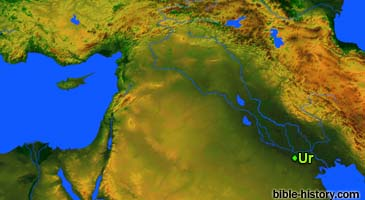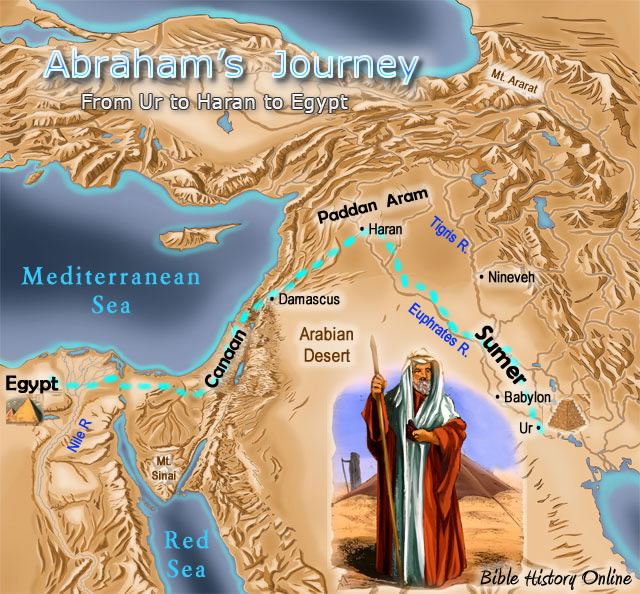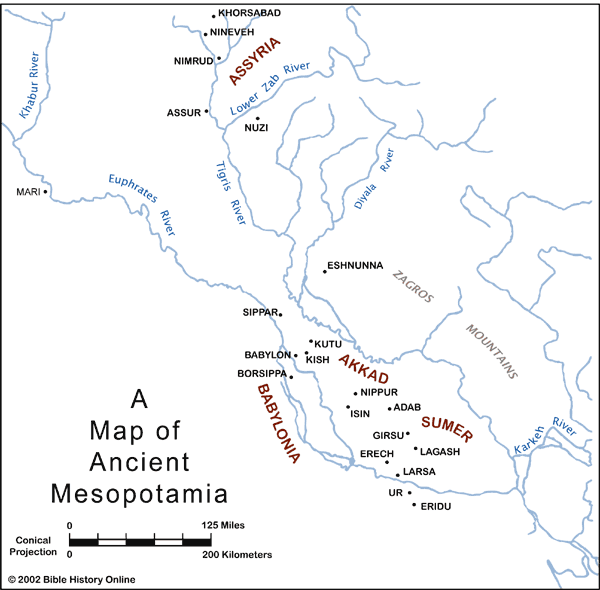Ur of the Chaldees

Small Map of Ancient Ur of the
Chaldeans
The Bible mentions that Abraham, the first Hebrew, was called by God to leave Ur of the Chaldees and to journey to a land that God would show him. Archaeologists have determined exactly where the city of Ur was located in ancient times.
Ancient Chaldea
The southernmost portion of ancient Sumer was
called Chaldea, and the most important Sumerian city was located on
the western portion of the Euphrates River and it was called Ur. The
land of Chaldea contain riches beyond imagination, and Ur was the
wealthiest city. The history in this region exceeds that of the land
of Egypt and its pyramids.
Ancient Ur
Daily Life. There has been much understood about daily living in ancient Mesopotamia. The great Ziggurat of ancient Ur was built by King Ur-Nammu who ruled the area of ancient Ur around 2100 BC. This would've been approximately 250 years after the great flood of Noah, according to Usshers chronology.
Archaeologists estimate that there were approximately 24,000 people living in the city of Ur during the time of Abraham. The people of ancient Mesopotamia worshiped many gods, and the people of Ur worshiped their chief god named Nanna, the moon-god. The people of Ur lived in one of two main areas in the city: a very religious sacred place, or the common district.
The Common District. The people of ancient Ur were highly advanced culture. The common district was filled with marketplaces, schools, libraries, and many of the people were very wealthy. People had very nice homes with lush gardens and many conveniences.
The Sacred Place. The very religious sacred place was in an extremely strategic location of the city protected by strong walls. The place was dedicated to the worship of the moon-god, Nanna. It was in this area that the Ziggurat was located, there were also other great temples made of stone. There also was a "sacred area" where people brought their gifts and offerings to the Nanna, the moon-god. They would also bring their contributions and pay their taxes in this place, because Nanna was believed to be their protector. There have been excavations in this area with recordings on stone tablets of peoples gifts and taxes. These tablets were kept in the temples within the sacred place.
Abraham. Around 2000 BC there was a man named Abram living in Ur of the Chaldees who was a descendant of the godly line that descended from Adam, the ones who were making sacrifices to the LORD. The LORD appeared to Abram while he was living in Ur of the Chaldees and promised him that if he would leave his country and journey to a land that he had never seen God would make his descendants outnumber the sand on the seashore, and the stars in the sky. God promised Abram also that from his descendents one "seed" would be the Savior of all mankind. Abram obeyed God and left the city and journeyed across the Fertile Crescent into the land of Canaan where he and his descendents were pilgrims until God gave them the land as an inheritance. God later changed Abram's name to Abraham which means "father of many nations". Abraham journeyed up and around the Fertile Crescent through the land of Canaan and into Egypt.

Map of the Journey of Abraham from Ur of the Chaldees
Geography of Ancient Ur
Mesopotamia in Smith's Bible Dictionary (Read Full Article)
Mesopotamia - (between the rivers), the entire country between the two rivers, the Tigris and the Euphrates. This is a tract nearly 700 miles long and from 20 to 250 miles broad, extending in a southeasterly direction from Telek to Kurnah. The Arabian geographers term it "the Island," a name which is almost literally correct, since a few miles only intervene between the source of the Tigris and the Euphrates at Telek. But the region which bears the name of Mesopotamia, par excellence, both in Scripture and in the classical writers, is the northwestern portion of this tract, or the country between the great bend of the Euphrates, lat. 35 degrees to 37 degrees 30', and the upper Tigris.
We first hear of Mesopotamia in Scripture as the country where Nahor and his family settled after quitting Ur of the Chaldees. Ge 24:10 Here lived Bethuel and Laban; and hither Abraham sent his servants to fetch Isaac a wife. Ibid. ver. 38. Hither too, a century later, came Jacob on the same errand; and hence he returned with his two wives after an absence of twenty-one years. After this we have no mention of Mesopotamia till the close of the wanderings int he wilderness. De 23:4 About half a century later we find, for the first and last time, Mesopotamia the seat of a powerful monarchy. Jud 3:1 ... Finally, the children of Ammon, having provoked a war with David, "sent a thousand talents of silver to hire them chariots and horsemen out of Mesopotamia, and out of Syria-maachah, and out of Zobah." 1Ch 19:6 According to the Assyrian inscriptions Mesopotamia was inhabited in the early times of the empire, B.C. 1200-1100, by a vast number of petty tribes, each under its own prince, and all quite independent of one another.
The Assyrian monarchs contended with these chiefs at great advantage, and by the time of Jehu, B.C. 880, had fully established their dominion over them. On the destruction of the Assyrian empire, Mesopotamia seems to have been divided between the Medes and the Babylonians. The conquests of Cyrus brought it wholly under the Persian yoke; and thus it continued to the time of Alexander. Since 1516 it has formed a part of the Turkish empire. It is full of ruins and mounds of ancient cities, some of which are now throwing much light on the Scripture.
Also see: Babylonia and Map of Ancient Mesopotamia

Map of Ancient Mesopotamia in 2000 BC (3rd Dynasty of
Ur)
Genesis 10:6-11 "The sons of Ham were Cush, Mizraim, Put, and Canaan. The sons of Cush were Seba, Havilah, Sabtah, Raamah, and Sabtechah; and the sons of Raamah were Sheba and Dedan. Cush begot Nimrod; he began to be a mighty one on the earth. He was a mighty hunter before the LORD; therefore it is said, "Like Nimrod the mighty hunter before the LORD." And the beginning of his kingdom was Babel, Erech, Accad, and Calneh, in the land of Shinar."
Read The Bible
- 1599 Geneva Bible (GNV)
- 21st Century King James Version (KJ21)
- American Standard Version (ASV)
- Amplified Bible (AMP)
- Amplified Bible, Classic Edition (AMPC)
- Authorized (King James) Version (AKJV)
- BRG Bible (BRG)
- Christian Standard Bible (CSB)
- Common English Bible (CEB)
- Complete Jewish Bible (CJB)
- Contemporary English Version (CEV)
- Darby Translation (DARBY)
- Disciples’ Literal New Testament (DLNT)
- Douay-Rheims 1899 American Edition (DRA)
- Easy-to-Read Version (ERV)
- English Standard Version (ESV)
- English Standard Version Anglicised (ESVUK)
- Evangelical Heritage Version (EHV)
- Expanded Bible (EXB)
- GOD’S WORD Translation (GW)
- Good News Translation (GNT)
- Holman Christian Standard Bible (HCSB)
- International Children’s Bible (ICB)
- International Standard Version (ISV)
- J.B. Phillips New Testament (PHILLIPS)
- Jubilee Bible 2000 (JUB)
- King James Version (KJV)
- Lexham English Bible (LEB)
- Living Bible (TLB)
- Modern English Version (MEV)
- Mounce Reverse Interlinear New Testament (MOUNCE)
- Names of God Bible (NOG)
- New American Bible (Revised Edition) (NABRE)
- New American Standard Bible (NASB)
- New American Standard Bible 1995 (NASB1995)
- New Catholic Bible (NCB)
- New Century Version (NCV)
- New English Translation (NET)
- New International Reader's Version (NIRV)
- New International Version - UK (NIVUK)
- New International Version (NIV)
- New King James Version (NKJV)
- New Life Version (NLV)
- New Living Translation (NLT)
- New Matthew Bible (NMB)
- New Revised Standard Version (NRSV)
- New Revised Standard Version Catholic Edition (NRSVCE)
- New Revised Standard Version, Anglicised (NRSVA)
- New Revised Standard Version, Anglicised Catholic Edition (NRSVACE)
- New Testament for Everyone (NTE)
- Orthodox Jewish Bible (OJB)
- Revised Geneva Translation (RGT)
- Revised Standard Version (RSV)
- Revised Standard Version Catholic Edition (RSVCE)
- The Message (MSG)
- The Voice (VOICE)
- Tree of Life Version (TLV)
- World English Bible (WEB)
- Worldwide English (New Testament) (WE)
- Wycliffe Bible (WYC)
- Young's Literal Translation (YLT)
Table of Contents
Main Menu
- Ancient Assyrian Social Structure
- Ancient Babylonia
- Ancient Canaan During the Time of Joshua
- Ancient History Timeline
- Ancient Oil Lamps
- Antonia Fortress
- Archaeology of Ancient Assyria
- Assyria and Bible Prophecy
- Augustus Caesar
- Background Bible Study
- Bible
- Biblical Geography
- Fallen Empires - Archaeological Discoveries and the Bible
- First Century Jerusalem
- Glossary of Latin Words
- Herod Agrippa I
- Herod Antipas
- Herod the Great
- Herod's Temple
- High Priest's in New Testament Times
- Jewish Literature in New Testament Times
- Library collection
- Map of David's Kingdom
- Map of the Divided Kingdom - Israel and Judah
- Map of the Ministry of Jesus
- Matthew Henry Bible Commentary
- Messianic Prophecy
- Nero Caesar Emperor
- Online Bible Maps
- Paul's First Missionary Journey
- Paul's Second Missionary Journey
- Paul's Third Missionary Journey
- Pontius Pilate
- Questions About the Ancient World
- Tabernacle of Ancient Israel
- Tax Collectors in New Testament Times
- The Babylonian Captivity
- The Black Obelisk of Shalmaneser
- The Books of the New Testament
- The Court of the Gentiles
- The Court of the Women in the Temple
- The Destruction of Israel
- The Fall of Judah with Map
- The History Of Rome
- The Incredible Bible
- The Jewish Calendar in Ancient Hebrew History
- The Life of Jesus in Chronological Order
- The Life of Jesus in Harmony
- The Names of God
- The New Testament
- The Old Testament
- The Passion of the Christ
- The Pharisees
- The Sacred Year of Israel in New Testament Times
- The Samaritans
- The Scribes
Ancient Questions
- Why Do the Huldah Gates Appear Different in Ancient Replicas and Modern Photos?
- What Is the Origin of the Japanese and Chinese Peoples? A Biblical Perspective
- How did the ancient Greeks and Romans practice medicine and treat illnesses?
- What were the major contributions of ancient Babylon to mathematics and astronomy?
- How did the ancient Persians create and administer their vast empire?
- What were the cultural and artistic achievements of ancient India, particularly during the Gupta Empire?
- How did ancient civilizations like the Incas and Aztecs build their remarkable cities and structures?
- What were the major trade routes and trading practices of the ancient world?
- What was the role of slavery in ancient societies like Rome and Greece?
- How did the ancient Mayans develop their sophisticated calendar system?
Bible Study Questions
- Why Do Christians Celebrate Christmas?
- How Many Chapters Are There in the Bible?
- The Five Key Visions in the New Testament
- The 400-Year Prophecy: Unpacking Genesis 15 and the Journey of a People
- The Authorized (King James) Version (AKJV): Historical Significance, Translation Methodology, and Lasting Impact
- Exploring the English Standard Version (ESV): Its Aspects, Comparisons, Impact on Biblical Studies, and Church Use
- A Detailed Historical Analysis of Language Updates in the KJ21: Comparison with Other Versions
- A Detailed Historical Analysis of the American Standard Version (ASV): Comparison to the King James Version, Influence on Later Translations, and Evaluation of Strengths and Weaknesses
- A Detailed Historical Analysis of Amplifications in the Amplified Bible (AMP) and Its Comparison to Other Bible Translations
- Detailed Historical Analysis of the Amplified Bible Classic Edition (AMPC): Examples of Amplifications and Comparative Analysis with Other Bible Translations
About
Welcome to Free Bible: Unearthing the Past, Illuminating the Present! Step into a world where ancient history and biblical narratives intertwine, inviting you to explore the rich tapestry of human civilization.
Discover the captivating stories of forgotten empires, delve into the customs and cultures of our ancestors, and witness the remarkable findings unearthed by dedicated archaeologists.
Immerse yourself in a treasure trove of knowledge, where the past comes alive and illuminates our understanding of the present.
Join us on this extraordinary journey through time, where curiosity is rewarded and ancient mysteries await your exploration.
Recent posts
-

Religion in the U.S.: Where Belief Is Quietly Changing
Religion in the United States is not disappearing, but it is gradually reshaping itself in ways that are easy to overlook. Public debates often focus ... -

Best Free Microsoft Office Alternatives in 2026
Microsoft Office is the standard of productivity but not all can afford its subscription model. Luckily, there are free alternatives that will provide... -

João Cotrim de Figueiredo: A Journey from Business Leader to Presidential Hope for a Modern Portugal
João Cotrim de Figueiredo (full name: João Fernando Cotrim de Figueiredo), born on June 24, 1961, in Lisbon, Portugal, is a prominent Portuguese bus... -

Modern Christian Abstract Art Canvas Prints | Artesty
Modern Christian Abstract Art: Contemporary Spiritual Wall Art for a Modern Home Modern Christian art makes it easier to bring faith into everyday spa... -

Best Paphos property developers (and how to choose the right one)
Buying property in Paphos is one of the most popular real-estate decisions in Cyprus, whether the goal is relocation, lifestyle living, or long-term i...
